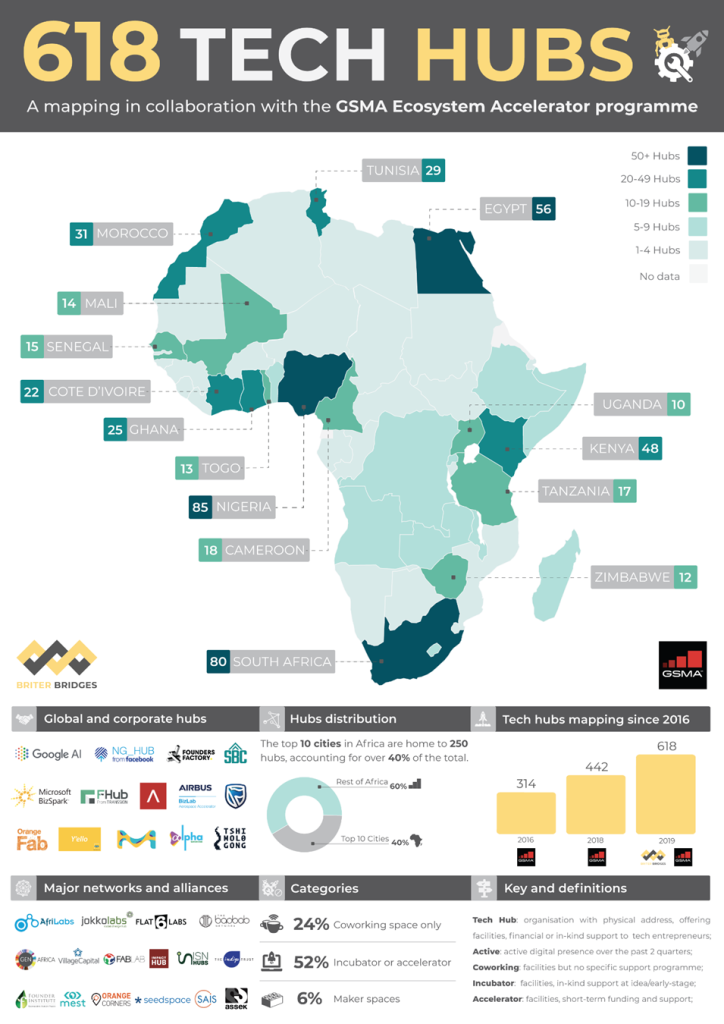
Why Cloud Computing is the Game-Changer for SMEs in Kenya
Introduction
Technology is a crucial enabler for small and medium-sized enterprises (SMEs) across the world. One such technological advancement that is making waves across industries is cloud computing.
Africa’s technology growth has primarily been made possible by several active tech hubs. Kenya is leading in East Africa’s technology space with 48 hubs currently.

Source: 618 Active Tech Hubs in Africa — Briter (briterbridges.com)
For SMEs in Kenya, cloud computing offers numerous benefits that can transform operations, enhance efficiency and drive growth.
However, according to Kenya Association of Manufacturers (KAM), SMEs in Kenya significantly contribute to the economy, yet many struggle with digital transformation.
Only 20-40% of SMEs have IT policies in place, and less than 25% use cloud computing indicating slow adoption rates but huge opportunity ahead.
Understanding the Basics
What is Cloud Computing?
Cloud computing refers to the delivery of computing services—servers, storage, databases, networking, software, and more—over the internet (“the cloud”). It allows businesses to access these resources on-demand without the need for physical infrastructure or in-house IT teams.
Types of Cloud Services
There are three main types of cloud services:
1. Infrastructure as a Service (IaaS): Provides virtualized computing resources (such as Virtual machines & VPS) as well as dedicated servers over the internet.
2. Platform as a Service (PaaS): Offers complete development and deployment environment over the internet, usually for software development.
3. Software as a Service (SaaS): Delivers software applications over the internet, on a subscription basis.
Benefits of Cloud Computing for SMEs in Kenya
Cost Efficiency
One of the primary benefits of cloud computing is cost efficiency.
SMEs often operate on tight budgets, and investing in expensive hardware and software can be prohibitive.
With cloud computing, businesses can avoid upfront costs and pay only for the resources they use.
For the average SMB, cloud services deliver a 36% cost savings by reducing the need for physical hardware and software and eliminating the need for IT personnel and infrastructure maintenance.
Scalability and Flexibility
Cloud computing offers unmatched scalability and flexibility.
As your business grows, you can easily scale your cloud resources up or down based on demand. This elasticity ensures that you always have the right amount of computing power, without over-committing to resources you don’t need.
Enhanced Collaboration
With Software as a Service (SaaS), employees can collaborate more effectively, regardless of their physical location.
Cloud computing facilitates real-time collaboration through shared documents, communication tools, and project management software. This is particularly beneficial for SMEs with remote or distributed teams.
Data Security
Contrary to common misconceptions, cloud computing provides enhanced data security.
Reputable cloud service providers invest heavily in security measures such as encryption, firewalls and multi-factor authentication.
SMEs in Kenya can take advantage of these advanced security protocols to protect sensitive data and reduce the risk of breaches.
Disaster Recovery and Business Continuity
Cloud computing provides robust disaster recovery solutions. In the event of hardware failure, natural disasters or cyber-attacks, data stored in the cloud can be quickly restored, ensuring business continuity.
This is a critical feature for SMEs that may not have extensive in-house IT support.
Conclusion
Cloud computing is a game-changer for SMEs in Kenya. By adopting cloud solutions, businesses can achieve cost savings, enhanced collaboration, scalability and improved data security.
With the right approach, cloud computing can drive significant growth and success for small and medium-sized enterprises.

